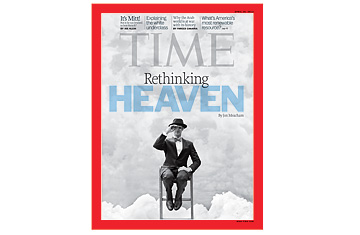
(6 of 6)
"So much of the emphasis saying 'Let's get away from this overly future orientation and focus on now,' it tends to come from white dudes wearing skinny jeans who live in the suburbs and not poor suffering people," says Erik Thoennes, chair of biblical and theological studies at Biola University and a pastor at Grace Evangelical Free Church near Los Angeles. "Just listen to some Negro spirituals and you will get a massive dose of future orientation, because they did not have the option of thinking that we have heaven on earth or that heaven is just an ethical heart within you."
God's Space--and Ours
At odds with all this is the secular scientific view expressed by Stephen Hawking last year. Dismissing the idea of heaven to the U.K.'s Guardian newspaper, he said, "I regard the brain as a computer which will stop working when its components fail. There is no heaven or afterlife for broken-down computers; that is a fairy story for people afraid of the dark."
The view prompted Wright to engage Hawking in the Washington Post, where Wright suggested that the secular dismissal is itself tied to a misconception of the afterlife. "Of course there are people who think of 'heaven' as a kind of pie-in-the-sky dream of an afterlife to make the thought of dying less awful," he wrote. "No doubt that's a problem as old as the human race. But in the Bible, 'heaven' isn't 'the place where people go when they die.' In the Bible heaven is God's space, while earth (or if you like, 'the cosmos' or 'creation') is our space. And the Bible makes it clear that the two overlap and interlock."
The case of Trayvon Martin offers a real-time illustration of the theological complexities of thinking about heaven. His parents believe him to be both at rest and at work, hoodied as a vivid symbol of the struggle to right the wrongs that led to his death. If the Wright camp is correct about the nature of things, there will someday be a second step: a bodily resurrection for Martin and all other believers on an earth ideally made better by the work of reform inspired by his death. Such, in this view, is the work of religion: bringing reality closer to conformity with theocentric aspirations in a world in which loving one another as we would be loved is a sacred act and a way of expanding the dominion of God--or heaven--in the world.
On Easter, in Christian churches large and small, many will hear the words of the 15th chapter of Paul's first letter to the Corinthians. It is about resurrection--first Jesus', then the great resurrection that is said to await all believers. The closing image of this mighty passage, though, is about not eternal bliss and peace but work, deeds, action: "Always give yourselves fully to the work of the Lord," wrote Paul, "because you know that your labor in the Lord is not in vain." In a vision of ultimate reward, a reminder of what is essential: the work that is always at hand.
Seven More Heavens
How other religions imagine the place where God resides
Buddhism - The Western Paradise
Buddhists of the Pure Land schools can achieve rebirth in wonderlands that are way stations toward Nirvana — the ultimate cessation of ego and desire. For example, the Buddha Amitabha has vowed that all who meditate and call on his name can enter his Pure Land, the Western Paradise, to be brought along to full enlightenment.
Tibetan Buddhism - Mount Kailasa
No human being has ascended Mount Kailasa in the Himalayas, but pilgrims of many faiths circumambulate it. Tibetan Buddhists associate it with Demchog, the central deity of an archetypal mandala. Kailasa is also the residence of the great Hindu god Shiva, whose meditative power emanates from the mountain to charge the universe.
Hinduism - Vaikuntha
The great Hindu god Vishnu reposes far above the highest heavens in Vaikuntha, a gathering place for those who have achieved moksha, or spiritual liberation, through him. It is also called Vishnupada (Vishnu's footstep), and because the god walks the earth, there are terrestrial Vishnupada, gateways to the sacred and eternal.
Islam - Al-Jannah
Islam believes the dead must await the Day of Resurrection to receive judgment. But Islam also provides many details about the rewards and pleasures awaiting the souls who are ushered into heaven, starting from its name, which means garden in Arabic, to rivers of wine and honey and, of course, the privilege of seeing God's face.
Judaism - Atziluth
While the Torah says little about heaven, the mystical writings on Kabbalah — particularly the works of the disciples of 16th century rabbi Isaac Luria — divided the cosmos into several spheres and layers, throughout which move the sparks of souls. The highest of these realms is Atziluth, from which the pure deity emanates.
Taoism - Da Luo Tian
In ancient China, heaven — tian — was not merely sky but a god. Then Confucianism leached the anthropomorphic from the idea. Taoism, however, layered it up like a cosmogonic pagoda. The Jade Emperor governs the universe from Da Luo Tian — the highest of 26 heavens — using an intricate celestial bureaucracy that parallels the earthly administration of imperial China.
Zoroastrianism - Garo Demana
The religion of Zarathustra inspired many an Abrahamic tenet, including the dichotomy of heaven and hell. After death, souls must try to cross a bridge. The blessed will ease over into Garo Demana — the House of Song. The damned head for Drujo — Demana — the House of the Lie.
